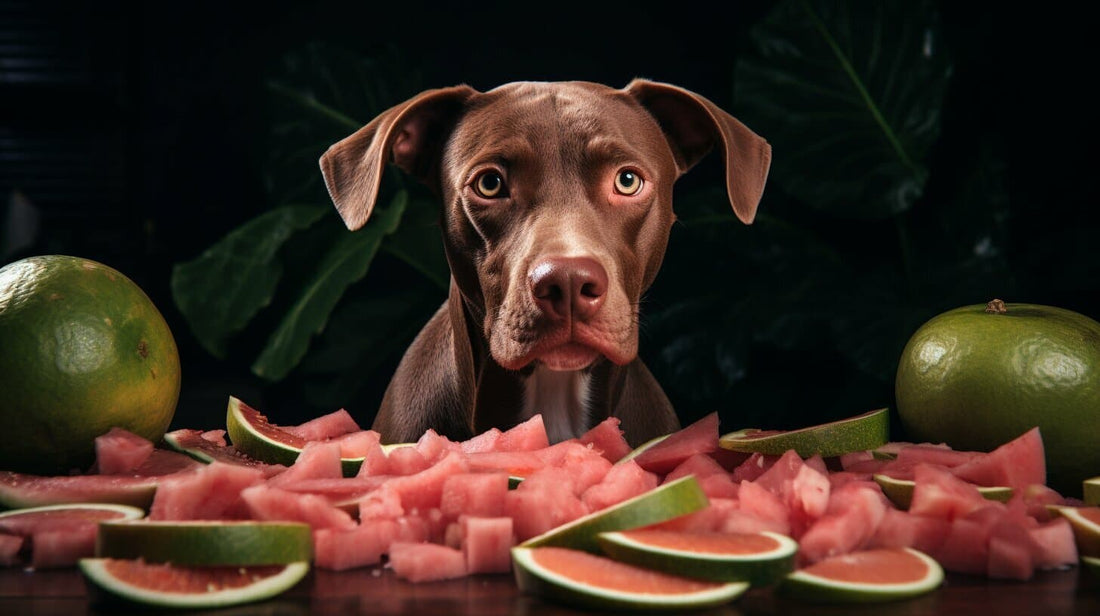As a pet owner, you're likely always on the lookout for healthy and tasty treats to give your furry friend. One fruit that you might be curious about is guava. But can dogs eat guava? In this article, we'll explore whether guava is safe for dogs to eat and provide a helpful guide for pet owners to follow.
Key Takeaways
- Guava can be a healthy and tasty snack for dogs in moderation
- It's important to be aware of any potential digestive issues that your dog may have when introducing guava into their diet
- As with any new food, it's best to start with small portions to make sure your dog can tolerate it well
Nutritional Benefits of Guava for Dogs
Guavas are a nutritious and delicious fruit that can offer several health benefits for dogs. They are particularly rich in vitamin C, which can boost their immune system and help fight off infections.
Additionally, guavas contain several other vitamins and minerals that can contribute to your dog's overall health. These include vitamin A, which supports eye and skin health, and potassium, which can help regulate blood pressure and keep the heart healthy.
Guavas are also a good source of dietary fiber, which can aid in digestion and promote bowel regularity. This can be particularly beneficial for dogs with digestive issues or constipation.
However, it's important to note that guavas should only be fed to dogs in moderation, as they are high in natural sugars and may cause gastrointestinal upset if consumed in excess.
Nutritional Benefits of Guava for Dogs
| Nutrient | Amount per 100g of Guava |
|---|---|
| Vitamin C | 228.3mg |
| Vitamin A | 31.0 IU |
| Potassium | 417mg |
| Fiber | 5.4g |
Overall, guavas can provide a range of nutritional benefits for dogs, but should be fed in moderation and as part of a balanced diet. As with any new food, it's important to introduce guava gradually and monitor your dog's reactions.

Guava and the Canine Digestive System
While guava can be a nutritious addition to your dog's diet, it's important to be aware of how it interacts with their digestive system. Some dogs may experience gastrointestinal issues after consuming guava, such as diarrhea or upset stomach. It's therefore recommended to introduce small amounts of guava to your dog's diet and monitor their reaction before incorporating it as a regular treat or supplement.
Guava contains high levels of fiber, which can benefit a dog's digestive health by aiding in regular bowel movements. However, too much fiber can also cause digestive discomfort, so it's important to balance guava consumption with other foods in their diet.
If your dog has a history of digestive issues or a sensitive stomach, it's best to consult with a veterinarian before introducing guava into their diet.

Feeding Guava to Dogs: Precautions and Considerations
While guava can be a healthy and delicious addition to a dog's diet in moderation, there are some important precautions and considerations that pet owners should be aware of.
Precautions for feeding Guava to dogs:
- Always remove the seeds and peel before feeding guava to your dog. The seeds can be a choking hazard, and the peel can be difficult to digest and may cause stomach upset.
- Avoid feeding your dog large amounts of guava at once, as this can cause diarrhea or upset stomach.
- Introduce guava slowly into your dog's diet to monitor their reaction and prevent any adverse effects.
- If your dog has a history of digestive issues or sensitivities, consult with your veterinarian before feeding guava or any new food.
In addition to these precautions, it's important to consider the overall balance of your dog's diet. While guava can provide valuable nutritional benefits, it should not be the primary source of your dog's diet. Always consult with a veterinarian to ensure that your dog is receiving adequate nutrition.

Can Puppies Eat Guava?
While guava is generally safe for adult dogs to eat, it's important to be cautious when feeding it to puppies. As with any new food, it's best to introduce guava to your puppy's diet gradually, starting with small amounts to gauge their reaction.
It's also important to note that puppies have more sensitive digestive systems than adult dogs, so feeding them too much guava or other fruits can lead to digestive issues such as diarrhea or upset stomach. As a general rule of thumb, puppies should only have a small amount of fruit as a treat or supplement to their regular diet.
If you're unsure about feeding guava to your puppy, or if they have any pre-existing health conditions, it's always best to consult with your veterinarian first.

Remember, every dog is different and may have different reactions to new foods. While guava can provide nutritional benefits to adult dogs, always be cautious when introducing it to puppies and monitor their reaction closely.
Guava Allergies in Dogs
While guava is generally safe and nutritious for dogs, some dogs may have allergies that cause adverse reactions to the fruit. Signs of an allergic reaction can include skin irritation, hives, itching, vomiting, and diarrhea. If your dog displays any of these symptoms after consuming guava, it is best to contact your veterinarian right away.
If your dog has a history of allergies, it is recommended to introduce guava slowly and in small quantities as a precaution. Additionally, it's important to note that guava leaves may contain compounds that can cause digestive upset in dogs. Therefore, it's best to avoid feeding your dog guava leaves and stick to the fruit instead.

If you suspect that your dog has a guava allergy, it's important to avoid feeding them the fruit and seek the advice of a veterinarian. Your vet can perform allergy testing to determine the specific allergen and provide appropriate treatment to manage your dog's symptoms.
Other Dog-Friendly Fruits
If you're looking to add a variety of fruits to your dog's diet, there are plenty of options besides guava that are safe and healthy for your furry friend. Here are some of our top picks:
| Fruit | Nutritional Benefits |
|---|---|
| Blueberries | High in antioxidants, fiber, and Vitamin C |
| Apples | Great source of fiber and Vitamin C, can freshen breath and clean teeth |
| Bananas | Rich in potassium and Vitamin C, can aid digestion and regulate blood pressure |
| Watermelon | High in water content, can help keep your dog hydrated and cool in hot weather |
Remember to always introduce new fruits slowly and in small quantities to avoid upset stomachs. Additionally, avoid giving your dog fruit with seeds or pits, such as cherries or peaches, as they can be a choking hazard or cause intestinal blockages.

Is Guava Toxic to Dogs?
Guava is generally considered safe for dogs to eat in moderation. However, there are some potential risks to be aware of, especially if your dog has a pre-existing medical condition or a sensitive digestive system.
One of the primary concerns with feeding guava to dogs is its high fiber content. While fiber is essential for digestive health, too much fiber can cause gastrointestinal upset, including diarrhea and bloating.
Additionally, some dogs may have an allergic reaction to guava, which can cause symptoms such as itching, swelling, and difficulty breathing. If your dog exhibits any signs of an allergic reaction after eating guava, it's important to seek veterinary care immediately.
Lastly, the seeds of the guava fruit can pose a choking hazard for dogs, especially small or toy breeds. It's best to remove the seeds before feeding guava to your dog, or avoid giving it to them entirely.
Overall, while guava is generally safe for dogs to eat, it's important to be mindful of the potential risks and to consult with a veterinarian before incorporating it into your dog's diet.

Guava as a Treat or Supplement for Dogs
Guava can be a tasty and nutritious addition to your dog's diet, but it is important to introduce it slowly and in moderation. As with any new food, start with a small amount to make sure your dog doesn't have any adverse reactions.
One way to incorporate guava into your dog's diet is by using it as a treat. Cut the fruit into small pieces and use them as a reward during training sessions or as an occasional snack.
Another option is to add guava to your dog's meals as a supplement. You can puree the fruit and mix it with their food or use it to make homemade dog treats. This can provide your furry friend with extra vitamins and nutrients.
It's important to note that guava should not be a substitute for a balanced and complete diet. It should be used as an addition or supplement to their regular food.

Incorporating guava into your dog's diet can provide numerous health benefits, including improved digestion, a boost to their immune system, and better skin and coat health. Just remember to always consult with your veterinarian before making any significant changes to your dog's diet.
Conclusion
So, can dogs eat guava? The answer is yes, guava is safe for dogs to eat, and in fact, it can provide a variety of health benefits. However, as with any new food, it is important to introduce it gradually and in moderation.
Guava is rich in nutrients such as vitamin C, fiber, and potassium, which can contribute to your dog's overall health. It is also low in calories and sugar, which makes it a great snack option for dogs who need to watch their weight.
When feeding your dog guava, it is essential to remove the seeds and skin, as they can pose a choking hazard or be difficult to digest. Additionally, it is crucial to monitor your dog for any signs of allergies or digestive discomfort.
If your dog enjoys guava, you can incorporate it into their diet as a treat or supplement. However, it should not replace their regular diet or any prescribed medication.
Final thoughts
In conclusion, guava can be a healthy and safe addition to your dog's diet, but it is essential to feed it to them in moderation and with caution. Always consult with your veterinarian about any changes to your dog's diet or health.
FAQ
Q: Can dogs eat guava?
A: Yes, dogs can eat guava, but there are some important things to consider before feeding it to your furry friend.
Q: What are the nutritional benefits of guava for dogs?
A: Guava is rich in essential nutrients such as vitamin C, fiber, and antioxidants, which can contribute to a dog's overall health.
Q: How does guava interact with the canine digestive system?
A: Guava can be easily digested by dogs and may even help improve their digestive health.
Q: What precautions should I take when feeding guava to my dog?
A: It's important to remove any seeds from guava before feeding it to your dog and to introduce it gradually into their diet to avoid any digestive issues.
Q: Is guava safe for puppies?
A: Yes, guava can be safely fed to puppies, but it's important to consider their age and size when determining the appropriate portion size.
Q: Can dogs be allergic to guava?
A: While it's rare, some dogs may be allergic to guava. If you notice any signs of an allergic reaction, such as itching or vomiting, it's best to consult with your veterinarian.
Q: Are there other fruits that are safe for dogs to eat?
A: Yes, there are several dog-friendly fruits, including apples, blueberries, and watermelon, that can be enjoyed by your furry companion.
Q: Is guava toxic to dogs?
A: No, guava is not toxic to dogs. However, as with any new food, it's important to monitor your dog for any adverse reactions.
Q: How can I incorporate guava into my dog's diet?
A: Guava can be given to dogs as a treat or added to their regular meals as a healthy supplement. Just ensure to offer it in moderation.


